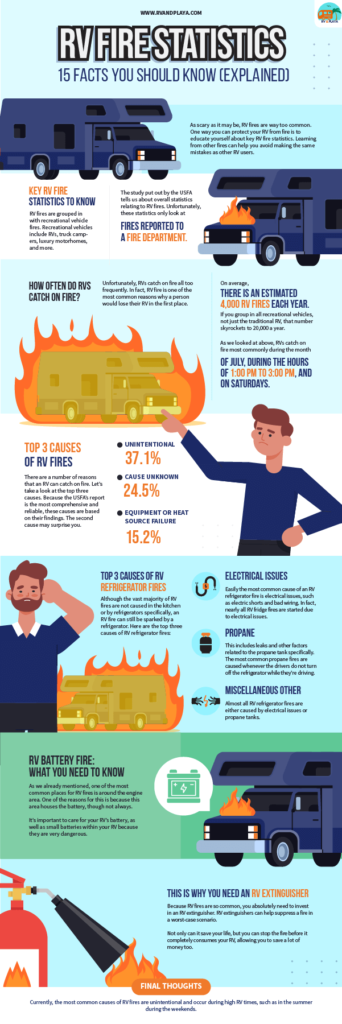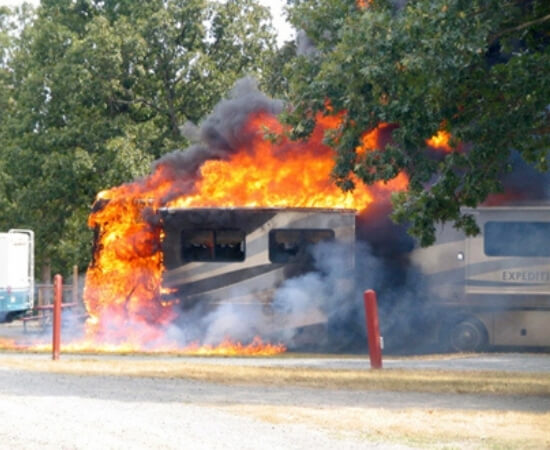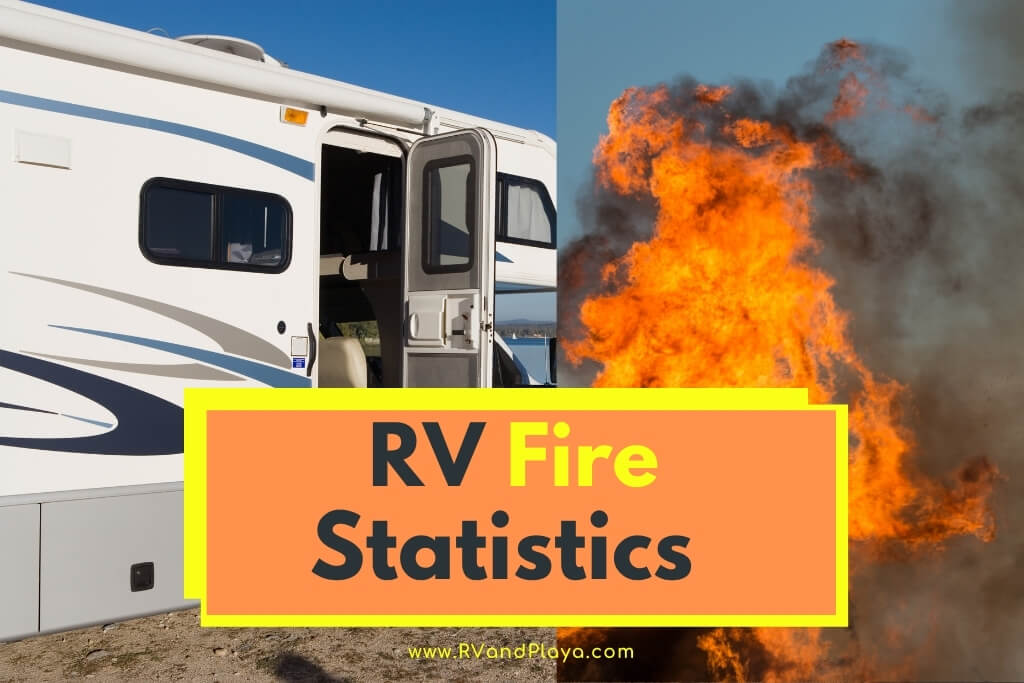Are you looking for RV fire statistics? Well, we´ve got you covered.
As scary as it may be, RV fires are way too common. One way you can protect your RV from fire is to educate yourself about key RV fire statistics. Learning from other fires can help you avoid making the same mistakes as other RV users.
In this article, we are going to tell you all the facts you need to know about RV fires. This includes how common they are, the average number of fatalities, the most common causes, and much more. Read on to find out all you need to know about RV fire statistics.
Table of Contents
Key RV Fire Statistics to Know
RV fires are grouped in with recreational vehicle fires. Recreational vehicles include RVs, truck campers, luxury motorhomes, and more.
According to the National Park Service, over 20,000 recreational vehicle fires occur every year. In fact, fire is one of the most common causes of RV loss today.
👉 One of the most comprehensive studies about RV fire was conducted by the US Fire Administration.
👉 Their study involved looking at RV fires between the years of 2016 and 2018.
👉 During these two years, there were around 3,700 RV fires in the United States.
The study put out by the USFA tells us about overall statistics relating to RV fires. Unfortunately, these statistics only look at fires reported to a fire department.
Many RV fires are not reported to a fire department because the owners were able to address the fire beforehand.
Nevertheless, the statistics put out by the USFA are some of the most comprehensive and accurate available.
Here are some RV fire statistics to know before you go on the road:
“…feel free to use our infographics. Just remember to give us credit.“

Fatalities, Injuries, and Dollar Loss
| Loss Measure | RV Fires |
|---|---|
| Average Loss: | |
| Fatalities per 1,000 fires | 4.6 |
| Injuries per 1,000 fires | 15.9 |
| Dollar loss per fire | $16,140 |
👉 As we already mentioned, the USFA found that there were 3,700 fires between 2016 and 2018.
👉 These fires resulted in nearly 15 deaths, 100 injuries, and $58,500,000 in loss.
👉 In fact, there were about 4.6 deaths per 1000 RV fires between these years.
👉 The average amount of dollar loss per RV was about $16,140.
Self Propelled vs. Not Self Propelled
In the same study, the USFA looked at how self propelled versus not self propelled affected the commonality of RV fires.
👉 Of the RV fires reported during this time, 16% were self propelled, meaning the vast majority, or 84%, were not self propelled.
RV Fires by Time of Day, Day of the Week, and Month
| Time | Percentage | |
|---|---|---|
| Time | Percentage | |
| Most Common Time of Day | 1 pm – 3 pm | 6.8% |
| Least Common Time of Day | 4 am – 5 am | 2.3% |
| Most Common Day of the Week | Saturday | 15.6% |
| Least Common Day of the Week | Wednesday | 13.4% |
| Most Common Month | July | 10.5% |
| Least Common Month | November | 6.9% |
👉 Another key feature that the USFA looked at during their 2016 to 2018 study was the most common time for fires.
👉 During these years, fires peaked between 1:00 and 3:00 PM.
👉 Nearly 14% of all RV fires occur during these hours.
👉 The least amount of fires were reported between 4:00 and 5:00 AM, where only 2% were reported.
These hours make sense because most people cook and use more potential fire starters during the early afternoon for dinner.
In contrast, most people are asleep early in the morning, resulting in fewer fires.
👉 Additionally, the study showed that most RV fires occurred on Fridays and Saturdays, though the numbers were only about 2% higher on these days.
The USFA predicts that this increase correlates to people driving and camping more on the weekend.
Finally, the last time feature that the USFA looked at when it comes to RV fire was the time of year. Overwhelmingly, the most RV fires occurred in July.
👉 Nearly 10.5% happened during this month. The second most common month for RV fires was May, which totaled 9.5% of the fires.
In contrast, the month with the least amount of RV fires was November.
👉 Only about 6.9% of RV fires reported during this time occurred in November.
Fire by Location in the RV
| Fire Origin Area | Percent |
|---|---|
| Engine area, wheel area, running gear | 28% |
| Other areas | 15.9% |
| Operator, passenger area | 9.8% |
| Cooking area | 7.5% |
| Vehicle exterior | 6.8% |
| Other areas | 3.6% |
| Cargo, trunk area | 3.5% |
Overwhelmingly, the majority of RV fires occurred in the engine area, wheel area, and running gears.
👉 After that, about 16% of fires were caused in miscellaneous areas. Surprisingly, only about 7.5% of RV fires started in a cooking area.
👉 The least common area for fire origin is the cargo or trunk area, resulting in only 3.5% of RV fires.
Read also: How Hot Can RV Tires Get & How to Prevent a Blowout
Cause of RV Fires
| Cause | Percent |
|---|---|
| Unintentional | 37.1% |
| Causes undetermined after investigation | 24.5% |
| Equipment or heat source failure | 15.2% |
| Cause still under investigation | 13% |
| Exposure | 6.3% |
| Intentional | 3.6% |
| Act of nature | 0.4% |
RV fires are pretty scary to think about. Because of how common they are, you’re likely wondering what the most common causes of RV fires are.
👉 The USFA found that around 37% of RV fires reported were caused by unintentional actions.
👉 The second most common cause was some sort of failure associated with RV equipment or heat source. About 15% of RV fires were caused in this way.
👉 Fire exposure and intentional actions caused 10% of RV fires, whereas natural causes, such as lightning, caused fewer than 1% of the fires.
👉 If you look at these numbers, there is still a remaining 37% of RV fire causes not listed. About 24% of RV fire causes were deemed unknown.
👉Around 13% of these RV fires are still under investigation.
How Often Do RVs Catch On Fire?
Unfortunately, RVs catch on fire all too frequently. In fact, RV fire is one of the most common reasons why a person would lose their RV in the first place.
👉 On average, there is an estimated 4,000 RV fires each year. If you group in all recreational vehicles, not just the traditional RV, that number skyrockets to 20,000 a year.

How often RVs catch on fire also relates to a number of factors, such as the time of year, day of the week, and time of day.
👉 As we looked at above, RVs catch on fire most commonly during the month of July, during the hours of 1:00 PM to 3:00 PM, and on Saturdays.
👉 Conversely, RVs are much less likely to catch on fire during November on Wednesdays during the hours of 4:00 AM and 5:00 AM. Of course, your RV can still catch on fire during this time, but it is statistically less likely.
Read also: RV Theft Statistics – 11 Facts You Should Know (Explained)
Top 3 Causes of RV Fires
There are a number of reasons that an RV can catch on fire. Let’s take a look at the top three causes.
Because the USFA’s report is the most comprehensive and reliable, these causes are based on their findings. The second cause may surprise you.
1. Unintentional – 37.1%
Overwhelmingly, most RV fires are caused by unintentional sources. 37.1% of RV fires were caused unintentionally.
To put that in perspective, that is 12.6% higher than the second leading cause of RV fires.
In other words, your RV is most likely to catch on fire because of some sort of accident or unintentional action on your part or the part of someone else in the vehicle.
2. Cause Unknown – 24.5%
Interestingly, the second most common cause for RV fires is actually unknown, even after investigation.
24.5% of RV fires are never resolved in terms of cause.
A number of reasons can lead to an unknown cause, such as there is not enough evidence or the fire being so bad that it burnt away all of the evidence.
3. Equipment or Heat Source Failure – 15.2%
Finally, the third most common cause of RV fires is the failure of a heat source or equipment. This cause makes a lot of sense.
Most likely, equipment or heat source failure is found in the engine or running gears, as well as the kitchen or cooking area.
RV fires – 6 minutes to total destruction! >> Check out the video below:
Top 3 Causes of RV Refrigerator Fires
Although the vast majority of RV fires are not caused in the kitchen or by refrigerators specifically, an RV fire can still be sparked by a refrigerator. Here are the top three causes of RV refrigerator fires:
1. Electrical Issues
Easily the most common cause of an RV refrigerator fire is electrical issues, such as electric shorts and bad wiring. In fact, nearly all RV fridge fires are started due to electrical issues.
Some RV refrigerator brands and models are even recalled because of these sorts of issues. Check to see if yours is on the list and change your fridge if it is.
2. Propane
Although it is rare, refrigerators that run on LP gas systems can cause fires due to their use of propane.
This includes leaks and other factors related to the propane tank specifically. The most common propane fires are caused whenever the drivers do not turn off the refrigerator while they’re driving.
Additionally, propane fires can be started due to lose chords and debris. Lose chords obviously lead to leaks and other nasty issues.
Meanwhile, debris can cause rust on the tank, also leading to gas leaks and fire.
3. Miscellaneous Other
Almost all RV refrigerator fires are either caused by electrical issues or propane tanks. There are a few other RV refrigerator fire causes reported, though there are nearly none.
Most of these causes are unknown.
RV Battery Fire: What You Need To Know
As we already mentioned, one of the most common places for RV fires is around the engine area. One of the reasons for this is because this area houses the battery, though not always.
It’s important to care for your RV’s battery, as well as small batteries within your RV because they are very dangerous.
All batteries can technically produce explosive gases, but this is especially true for large batteries, such as those used in your RV.
It’s imperative to check your battery monthly to ensure it works as it should. Whenever handling batteries, use with extreme care because they can explode and cause RV fires afterward. During the inspection process, replace any swollen batteries.
In addition to caring for your RV battery, be sure to keep all flames, sparks, and cigarettes away from the battery.
Ensure the battery compartment is ventilated, as well as keep all bent caps tight and level. Whenever small batteries are not used, store them in a fitted plastic container. This will prevent fires.
This Is Why You Need an RV Extinguisher
Because RV fires are so common, you absolutely need to invest in an RV extinguisher. RV extinguishers can help suppress a fire in a worst-case scenario.
Not only can it save your life, but you can stop the fire before it completely consumes your RV, allowing you to save a lot of money too.
There are three main types of fire extinguishers, including dry chemical extinguishers, AFFF foam extinguishers, and automatic clean agent gas extinguishers.
Of these three types, AFFF foam extinguishers are the best for an RV, but automatic clean agent gas extinguishers are great for confined areas, such as the area behind your fridge.
There are other types of extinguishers, such as air pressurized water extinguishers and carbon dioxide extinguishers.
Both of these are suitable for Class A and Class B fires, and carbon dioxide extinguishers are also suitable for Class C fires. The difficulty with these extinguishers is that they’re way less common.
Final Thoughts
As you can see, RV fires are way too common and can lead to loss of your RV, if not loss of your life.
Currently, the most common causes of RV fires are unintentional and occur during high RV times, such as in the summer during the weekends.
Luckily, there are things you can do to make fire less likely. Most importantly, install fire protection features, such as a fire alarm and fire extinguisher.
Additionally, maintain all electrical and system parts of your RV, as well as be smart when handling batteries and other sensitive items.
Though these tips won’t eliminate risk entirely, they will make your RV much safer from fires.
References
Recent Posts
Are you looking for RV theft statistics? Well, when you think about vehicle theft, you probably think of someone hot wiring a sports car and driving off into the sunset. You probably don't think...
All you wanted to do was to give your travel trailer a good spring cleaning, stock up, hook up and go. The problem is, it isn’t where you left it. You thought putting it in a secured storage...

